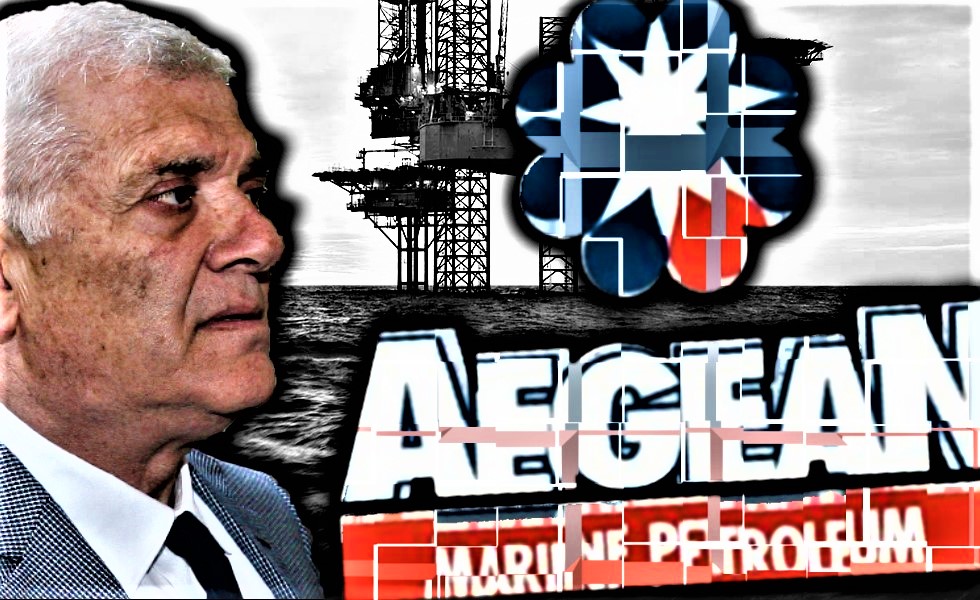
By Eleftherios Charalampopoulos
Part 2
In the first part of our article on the lawsuit filed in Luxemburg against Dimitris Melissanidis, his son Georgios, Luxemburg-based Grady Properties Corporation SA, Leveret International S.A, OilTank Engineering and Consulting Ltd and both liquidators of Leveret, we have examined the way in which OilTank Engineering and Consulting Ltd (henceforth ΟΤΕ) appears to collect huge amounts of money to build a Terminal in Fujairah on behalf of Aegean Marine Petroleum Network – ΑMPNI (henceforth Aegean), which -according to the plaintiffs- shows that part of these funds finally benefited the defendants. This is the follow-up of our effort to trace the money and disclose all attempted cover-up.
When everything leads to Grady
Apart from OTE-mediated transactions, the lawsuit pertains also to Grady transactions. According to the lawsuit, on January 16, 2014, “AMP LLC paid USD 6,276,240 to Grady. None of the defendants has produced any contractual documentation to explain Aegean’s obligation to make this payment”.
Grady belongs to Georgios Melissanidis, son of Aegean’s founder, while “it seems that, originally, Grady belonged to Dimitris Melissanidis’ brother, Iakovos Melissanidis”. Plaintiffs argue that this no non-controlled company, that in fact “this company was then, and remains, a repository of the wealth generated by Dimitris Melissanidis and that he is able to exercise practical control of Grady’s assets when needed” and that top executives in Grady and its subsidiaries overlap with those in companies controlled by Melissanidis.
As read in the lawsuit, “Grady has been and continues to be a holding company for various Melisanidis family business interests”. This is demonstrated by the fact that it fully (100%) owns Yeonama Holdings Co Ltd and Aegean Net Fuels Ltd, both also controlled by the Melissanidis family. Georgios Melissanidis also owns 100% of Georgiella Holdings Co. Ltd.
As per the lawsuit, Grady played an important role in the way the Melissanidis family took part in OPAP’s privatization procedure. One also reads there that “Dimitris Melissanidis incorporated a Cypriot company called Yeonama on 26 July 2012 to make the investment in Emma Delta.Yeonama was initially owned as to 40% by Leveret, 30% by Grady and 30% by Gtech (which was a company involved in the Italian gaming industry)”. Emma Delta was a joint venture with Jiri Smejc and other investors to acquire a 33% stake in OPAP SA. Yeonama received OPAP SA investment shares. Another undertaking controlled by the Melissanidis family, Georgiella (which Georgios Melissanidis owns by 100%), acquired 33% of management shares in Emma Delta. According to the lawsuit, although Georgios Melissanidis might have appeared as the member of the Melissanidis family running this investment, “subsequent shareholder agreements between DM, Jiří Šmejc and other entities that owned a stake in or managed OPAP demonstrate that DM was indeed the beneficial owner and exercised control over the OPAP investment and related entities, including Georgiella and Grady subsidiary Yeonama”. It is argued in the lawsuit that the fact that Dimitris Melissanidis exercised proper control on Grady is also concluded by other evidence, such as the correspondence of taking part in other investments where Grady was presented as “ultimately owned by and under the control of of Dimitris Melissanidis”.
The defendants argue that this payment pertained to “the practice of assistance with short-term liquidity requirements to Aegean” and as “a liquidity facility to AMP LLC” and that “the $6.2 million paid by Aegean to Grady in January 2014 was in part repayment of three separate payments totaling $6,575,178 Grady had made to Aegean in November and December 2013”.
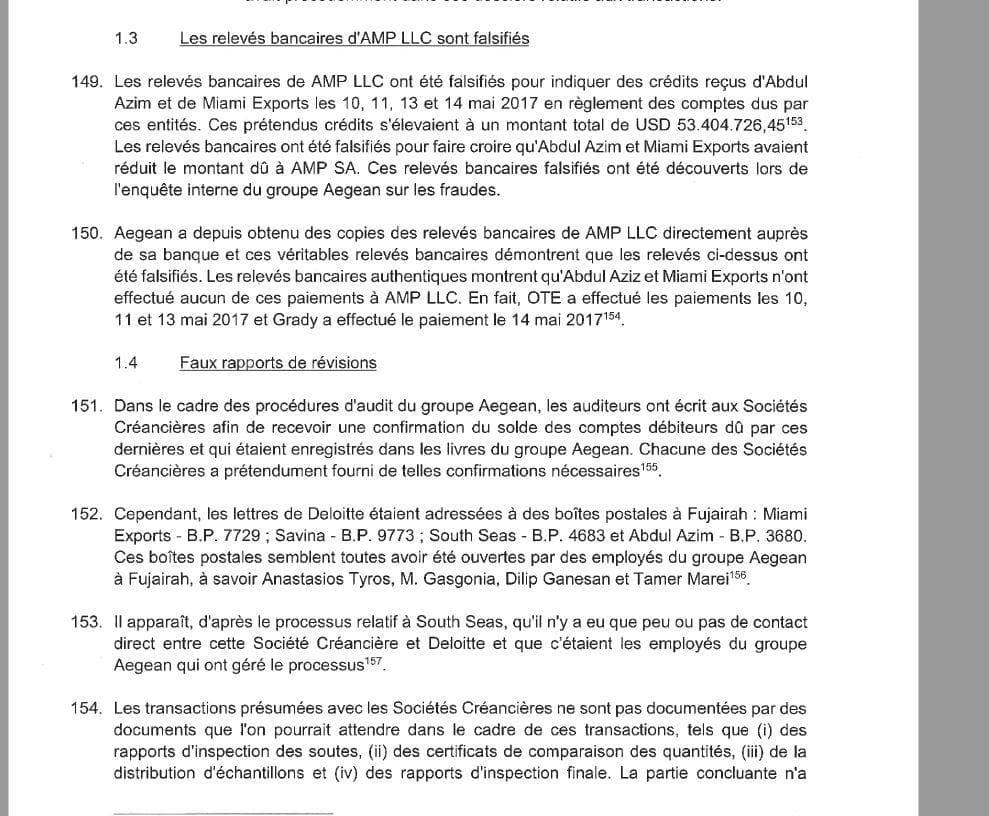
It is argued in the lawsuit that “no document was presented that record the terms of the alleged loans. There is no loan agreement and no written documentation explaining one of these payments”. Said loans “are not mentioned in AMPNI’s annual 2013 or 2014 reports as an outstanding borrowing”. The 2013 payments were sent to AMPSA, whereas the payment to Grady was performed by AMPLLC. Moreover, there are AMP SΑ payments to Grady: USD 3,571,835 on January 17, 2014 and 6,000,000 on January 30, 2014. In the lawsuit, it is pointed out that “during the critical time periods of misappropriation (from 2014 to 2017), Grady’s statutory auditor was Dimitris Mathiopoulos, who was also a senior advisor to Dimitris Melissanidis”.
False transactions involving also… heavy fuel oil
It is argued in the lawsuit that “serious misconduct, in particular falsification of bank statements and internal accounting records, was commonplace within the Aegean Group during the time Dimitris Melissanidis controlled it”. Moreover, attempts were made, by means of practices such as the “fictitious trade of heavy fuel oil”, to present Aegean as being in better financial health than it in fact was.
It is mentioned in the lawsuit that “between 2015 and 2017, Dimitris Melissanidis caused AMP SA to execute at least 39 purported contracts for the purchase and resale of fuel oil with four companies. Under these contracts the four companies were to sell Aegean “off-spec” fuel oil, which Aegean would blend and sell back to the four companies at a higher price.” 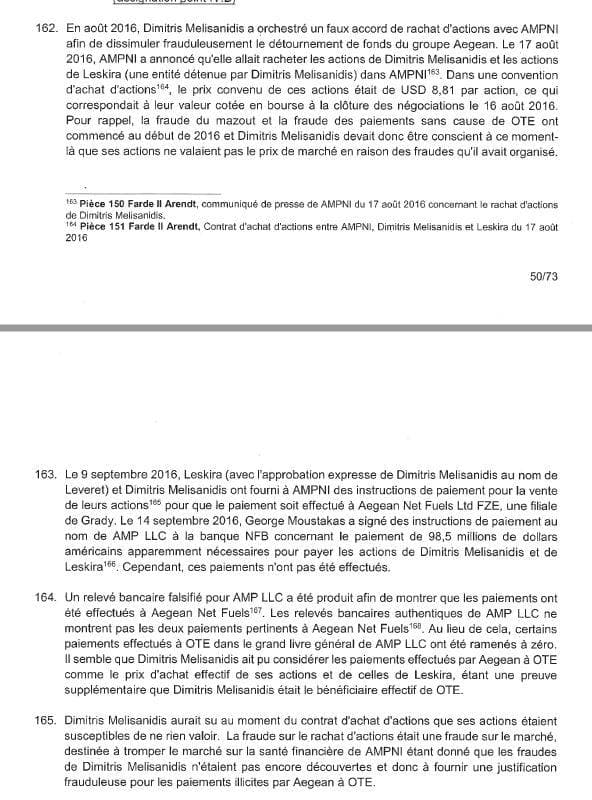
These four companies, South Seas Maritime Ltd., Abdul Azim Trading FZE, Miami Exports Group LLC, Savina Maritime Ltd. (“The Debtor Companies”) and AMP SA (an Aegean Group company) “sent each other sham invoices between at least 1 January 2016 and 30 September 2017. These sham invoices produced purported net positions whereby the Debtor Companies owed increasing sums to AMP SA. At year-end 2017 the Debtor Companies purportedly owed to AMP SA a total of US $199,642,313.52”.
According to the lawsuit, these are sham transactions. The necessary certificates of quantity for the fuel sold were forgeries. AMP LLC’s bank statements were falsified to show credits received from these companies in settlement of the accounts owned by these entities, while, in reality, they were payments by ΟΤΕ and.
These companies had P.O. Boxes in Fujairah that “all appear to have been opened by Aegean employees in Fujairah namely Mr. Tyros, Mr. Gasgonia, Mr. Dilip Ganesan and Mr. Tamer Marei ”.
How are Grady and ΟΤΕ involved in the “heavy fuel fraud”?
Grady seems also to be involved in the “heavy fuel oil fraud”, since “on 14 May 2017 Grady paid $25 million to AMP LLC and AMP LLC repaid Grady, seemingly with a small amount of interest, on 24 May 2017”. Grady and Georgios Melissanidis claim it was a short-term loan, as Grady used to do. However, the payment was made four days before the Audit Committee was to convene and discuss about these companies, while “in the falsified bank statement, this payment was falsified so that it appeared to be from Miami Exports”. 
We note that it is supported the lawsuit that the related loan agreement dated May 11, 2017 is “a copy and pasted version of the loan agreement dated 24 October 2016. Grady and Aegean did not notice that the repayment date had not been updated. The repayment date for the loan agreement dated 11 May 2017 is 28 December 2016 It has the same error at the signing page, misstating AMP SA as the lender and Grady as the receiver. Although AMP SA was the borrower and the entity obligated to repay the loan, it was AMP LLC that received the funds from Grady and repaid the funds to Grady 10 days later”.
According to the lawsuit, OTE was also involved in the heavy fuel oil case: “In the period 7 – 13 May 2017 OTE made three payments to AMP LLC totaling US $28,404,731.90. During the same time period, AMP LLC made four payments to OTE totalling US $24,500,000. Copies of AMP LLC’s bank records were again falsified so that all these payments appeared to be between AMP LLC and Abdul Azim, one of the Debtor Companies (…)In this way there appeared to be active trading activity with Abdul Azim that had resulted in net receipts to AMP LLC and therefore that the accounts receivable were decreasing.”
The Share Buyback
According to the lawsuit that “in August 2016 DM engineered a sham share buyback purchase agreement with AMPNI in order to fraudulently conceal the misappropriation of funds from Aegean”. In particular, it was announced that AMPNI would purchase shares owned by Melissanidis and Leskira (a company controlled by him) at the price of 8.81 dollars per share, which was the market price upon completion of negotiations. The lawsuit says that “the heavy fuel oil fraud and that the OTE payments fraud began in early 2016, and so Dimitris Melissanidis must have been aware at this time that his shares were not worth their market value, because of the frauds he was orchestrating on Aegean ”.
It is argued in the lawsuit that although payment instructions to Aegean Net Fuels ZTE, Grady’s subsidiary for this transaction, were signed, they were never executed. According to the lawsuit, “a falsified bank statement for AMP LLC was produced purporting to show the payments being made to Aegean Net Fuels. AMP LLC’s genuine bank statements do not show the two relevant payments to Aegean Net Fuels. On the contrary, some of the payments to OTE have been zeroed in AMP LLC general ledger. Instead certain payments made to OTE in AMP’s general ledger were written down to zero. It appears that Dimitris Melissanidis may have treated payments made by Aegean to OTE as the effective purchase price for his and Leskira’s shares. This is further evidence that Dimitris Melissanidis beneficially owned OTE”. 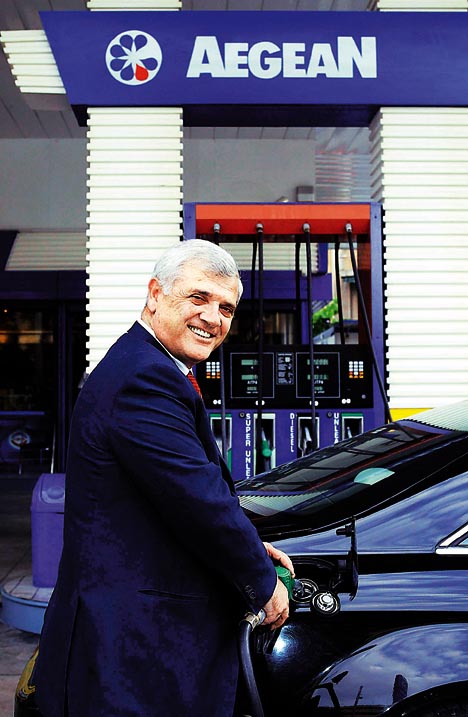
Moreover, according to the lawsuit “as part of further efforts to cover up the frauds perpetrated against Aegean, Dimitris Melissanidis and other parties affiliated with him concealed payments made by Aegean to OTE by removing the name of OTE in Aegean’s records and inserting the name of a different company, REMAT”.
The lawsuit makes reference to emails towards the company’s accountants to erase payments to OTE, or to erase the OTE name, or requesting “that AMP’s General Ledger be amended so that sums paid to ‘Oil Tank’ read as payments to ‘Remat’’”. It is argued in the lawsuit that “Tamer Marei controls REMAT. Ηe was the former Assistant General Manager of AOTC and used to work at the Fujairah Terminal. Notably, REMAT is Mr. Marei’s first name spelled backwards”.
The Melissanidis side, via his lawyers during the case hearing in Cyprus, supported that they consider these allegations as “manifestly irrelevant” and that this fraud may not be attributed to Melissanidis, so they have nothing to say about it.
The plaintiffs argue that the heavy fuel oil fraud “is particularly relevant as it overlaps in time with the OTE Payment Frauds. At the same time as Dimitris Melissanidis was syphoning funds out of Aegean through OTE, the Heavy Fuel Fraud was being used to prop up Aegean’s balance sheet”.
Final attempt for a cover-up
According to the lawsuit, “23 May 2017, the Audit Committee of AMPNI discussed AMPNI’s relationship with four customers with whom it had US $172 million of outstanding accounts receivable. These debts had delayed completion of PricewaterhouseCoopers’ (PwC; AMPNI’s auditors at that time) year-end audit and the filing of AMPNI’s annual report for year-end 2016”. In November 2017, the Audit Committee of AMPNI (Aegean) retained a law firm to investigate the amounts due that were no less than $200 million.
That was the time when the takeover proposal of HEC Europe emerges. The agreed price was 367 ml. dollars, which included debt assumption, certain accounts receivables and shares of Aegean. According to the lawsuit, “the consideration to be paid by AMPNI included the approximately $200 million of fraudulent accounts receivable36. This proposed transaction was Dimitris Melissanidis’s final attempt to prevent the discovery of the fraud. If the transaction had proceeded, it would have removed the fraudulent accounts receivable from AMPNI’s books and may have prevented the discovery of the frauds”.
See here the lawsuit filed in a Luxembourg court
Conclusions Arendt_01_10_21_TAL1_R_le TAL-2019-08836-c
To be continued…
Latest News

WTTC: Travel & Tourism to Create 4.5M New Jobs in EU by 2035
This year, international visitor spending is set to reach 573 billion euros, up by more than 11% year-on-year

IMF: US Tariffs Shake Global Economy, Outlook Downbeat
IMF slashes global growth forecast to 2.8% as U.S. tariffs create uncertainty and ‘negative supply shock

First Step Towards New Audiovisual Industry Hub in Drama
The project is set to contribute to the further development of Greece’s film industry and establish Drama as an audiovisual hub in the region

Airbnb Greece – Initial CoS Ruling Deems Tax Circular Unlawful
The case reached the Council of State following annulment applications filed by the Panhellenic Federation of Property Owners (POMIDA)

Mitsotakis Unveils €1 Billion Plan for Housing, Pensioners, Public investments
Greek Prime Minister Kyriakos Mitsotakis has announced a new set of economic support measures, worth 1 billion euros, aiming to provide financial relief to citizens.

Alter Ego Ventures Invests in Pioneering Gaming Company ‘Couch Heroes’
Alter Ego Ventures' participation in the share capital of Couch Heroes marks yet another investment by the Alter Ego Media Group in innovative companies with a focus on technology.

Corruption Still Plagues Greece’s Driving Tests
While traffic accidents continue to claim lives on Greek roads daily, irregularities and under-the-table dealings in the training and testing of new drivers remain disturbingly widespread

Pope Francis Died of Stroke and Heart Failure Vatican Confirms
As news of the official cause of death spread, tributes poured in from across the globe. The 1.4 billion-member Catholic Church is united in grief, remembering a pope who championed inclusion, justice, and compassion

Increase in Both Museum Visits, Revenues for 2024
As expected, the Acropolis was the top archeological site in the country, followed by Sounion, Mycenae, the ancient theater of Epidaurus, and Vergina in northern Greece

Where Greece’s Tourists Come From: A Look at 2025’s Top Visitor Markets
The United Kingdom continues to hold the top spot as the largest source of incoming tourism, with 5.6 million seats booked for Greece this summer — up 2.2% from last year. This accounts for 20% of all international air traffic to Greece

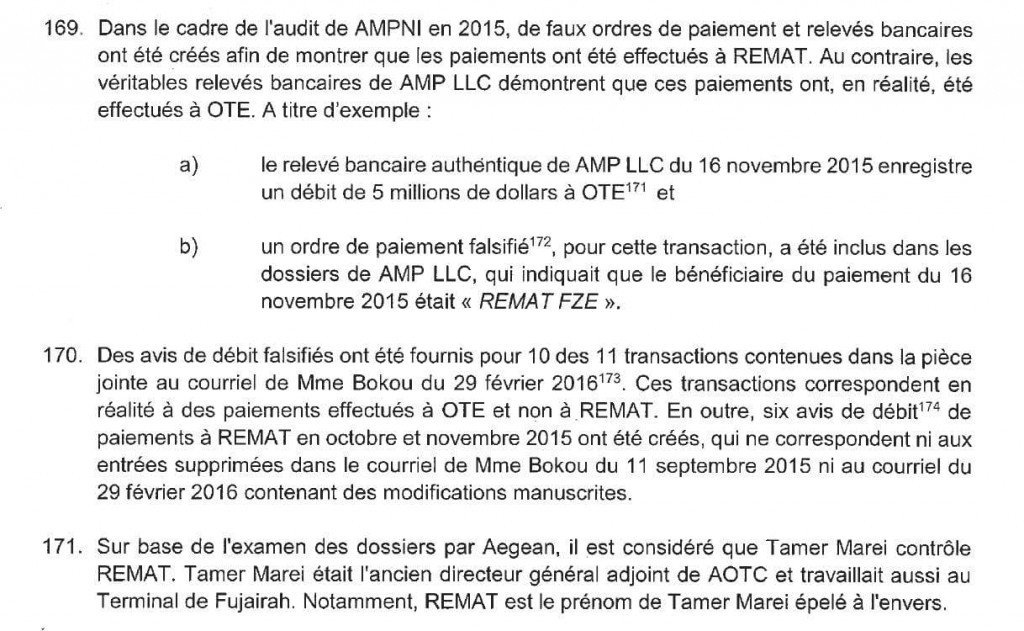















![Ξενοδοχεία: Μεγάλο το ενδιαφέρον για επενδύσεις στην Ελλάδα – Η θέση της Αθήνας [γραφήματα]](https://www.ot.gr/wp-content/uploads/2025/03/Athens-hotels-90x90.jpg)
















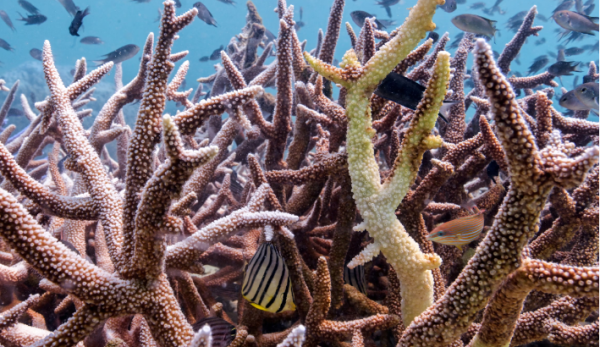







 Αριθμός Πιστοποίησης
Αριθμός Πιστοποίησης